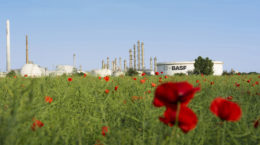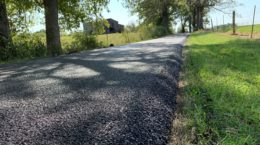B2Last offers great advantages for the roofing industry
The application of BASF’s B2Last as an asphalt modifier has been showing positive results from its trials and tests on roads across the U.S. This success has driven the company to explore other options for asphalt modification. One of those options is within the roofing industry as an additive to replace or reduce the use of styrene-butadiene-styrene (SBS) in the production of asphalt roofing products.
“SBS is used to modify asphalt for underlayments, peel and stick and other applications. It requires a lot of SBS to reach the specifications and meet requirements,” explains Brian Orr, Senior Asphalt Technologist at BASF. “With the synergy that occurs with B2Last, you can cut back the amount of SBS that is needed by a significant amount.”
One significant benefit of using B2Last is that it helps stabilize the asphalt and SBS, addressing the issue of separation.
“Heat and storage cause SBS to actually float out of solution and separate from the asphalt binder. With B2Last it’s a chemical reaction that occurs and turns asphalt into more functional asphalt, it cannot separate,” Orr says. “We’ve found that B2Last compatibilizes the asphalt and the SBS, so the SBS actually disperses into a more uniform matrix within the asphalt solution and does not separate out once that reaction occurs and ages-in. It stabilizes the SBS. What we’ve found in our BASF laboratories is that we can stabilize modified asphalts to the point of having less than a degree of separation between the top and bottom of a separation test, which is very significant.”
“With the synergy that occurs with B2Last, you can cut back the amount of SBS that is needed by a significant amount”
According to Patrick Hamilton, Process Laboratory Manager at BASF, stabilization is particularly important in the production of roofing products, which can be highly modified with SBS in the realm of 10 to 15 percent SBS modification.
“Quite often, I’m told, that roofing manufacturers will modify roofing asphalts and use them immediately before their modified asphalt destabilizes. With B2Last, you can think about slowing down cycle times if needed, where you could schedule better and prepare for samples if you’re doing on-the-fly modifications,” says Hamilton. “In those situations, if you’re having stability issues with your modifications, you know you have to use the product right away or you risk losing materials from fouling. With B2Last, you can prepare a batch of modified asphalt and have it ready to go, indefinitely, when you need it.”
This can also offer advantages in terms of storage.
“If you have a storage tank of liquid asphalt and want it modified with B2Last, and then there is a delay in production, there is no time pressure. Once you react it in, it’s a fairly stable material,” Hamilton says. “I’ve dealt with systems in the past where settlings from different suspensions and emulsions required additional engineering, such as recirculation and adequate stirring. With B2Last, you don’t have to worry about adding anything extra to it to keep it suspended or in place. Once you modify it, it’s done.”
Another benefit of utilizing B2Last is a significant reduction in hydrogen sulfide (H₂S).
“Hydrogen sulfide is an issue with asphalt. We’ve done studies where you remove that as a potential hazard from the system with B2Last. You can see a marked difference in H₂S to almost none,” Hamilton says.
BASF is also researching methods to use B2Last to reduce the amount of air blowing needed in roofing product manufacturing processes.
“Adding B2Last creates a more usable and functional product, rather than one that requires oxidizing and air blowing,” Orr says.
One of the reasons B2Last offers advantages is the anti-aging characteristics it offers asphalt products when compared to air blowing.
“As asphalt ages and oxidizes – which is what air-blown asphalt is for roofing – it creates more and more asphaltene content, and this causes oxidation, cracking, and the material to not last as long,” Orr explains. “B2Last actually ties up those asphaltenes and creates a situation where, as the asphalt ages and oxidizes, it does not create more asphaltene. It’s an anti-aging characteristic of B2Last and asphalt.”
According to Bernie Malonson, Marketing and New Business Development Manager, North American Monomers at BASF, B2Last has the potential to offer a more sustainable solution for the roofing asphalt industry.
“With the potential for longer lasting shingles with B2Last modification there will be less waste going into landfills and a more sustainable solution. It’s better for the environment,” says Malonson.
Another sustainable benefit B2Last offers roofing products manufacturers is a reduction in VOCs (volatile organic compounds) due to lower heat requirements in the production process by using a paving grade asphalt for roofing grade materials. This represents improved sustainability practices as well as cost savings.
“With the air blowing process, they need about 500°F. With paving, they’re at 350°F,” Malonson says. “As we work through the qualification process, we’re always looking to discuss potential operational efficiencies with customers and how they can rethink their processes to help reduce cost throughout the total process.”
B2Last also has the potential to reduce the overall amount of polymer required in the production process of various roofing products.
“Our preliminary evaluations are showing very positive results, especially in areas of separation reductions, lower emissions and the ability to potentially make paving-grade asphalts meet roofing grade specifications,” Malonson says. “The interest in roofing applications has been very exciting for us. We announced the availability of B2Last-R in conjunction with the International Roofing Expo in Las Vegas, in August 2021. We’re really focusing on the needs of the customers and industries we serve, and this is just another proof point. We’re excited to be part of it.”
learn more about B2Last’s advantages for the roofing industry, visit: BASF introduces B2Last-R modified asphalt solution to the North American roofing systems market





